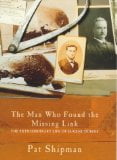 The Man Who Found the Missing Link: The Extraordinary Life of Eugene Dubois
The Man Who Found the Missing Link: The Extraordinary Life of Eugene Dubois
by Pat Shipman
Weidenfeld and Nicholson, £25.00, 0297842900
This is not a biography in the classical sense nor a novel in the ordinary sense. We will have to call it a fictional biography, where the thoughts of the protagonist and his contemporaries are freely sketched, and other material to which the author could not have had access is interpolated.
Although Shipman utilized the Dubois Archives, which contained letters, manuscripts, diaries, and so on, all of which are credited in the endnotes, she states that after Dubois’ death his daughter spent days burning materials that she did not want to be archived. What did these contain? Shipman once or twice hints at homosexuality as a young man, although she never actually comes out and makes the statement. In describing his later life, however, she portrays him as having liaisons with housemaids and others.
Some criticism could be levelled at the author’s style: “They both could see the idea dancing at the edge of their consciousness like a shy woodland creature that hesitated at the edge of a clearing.” She is not above filling space with a three-inch list of the attendees at a conference. Her list of acknowledgements includes her cat and her horse. She refers to Piltdown Man, Eoanthropus dawsoni, as if it were a real discovery and not a proven fraud. As painted, Dubois was a man who carried a basketful of demons throughout his life. He was vain, jealous, always suspicious of the motives of his friends and coworkers, and had all the race prejudices common to the era (born 1858, died 1940). Early in his professional career he was exposed to a boss who took sole credit for his work, and he learned enough from that experience to use it later when he was top dog. The author categorises him as “irascible, paranoid, brilliant and stubborn”.
After the initially bad reception of his claims to have discovered Pithecanthropus erectus, his name for the missing link, he became a recluse for many years and refused to allow other scholars to study the fossils he had collected. His relations with assistants were always stormy and he seldom gave credit for work well done and never allowed himself to be corrected if in error. This book is a good read but has no specific interest for skeptics. If the subject matter intrigues you, I would recommend borrowing it from the library.



